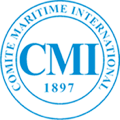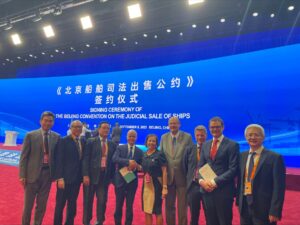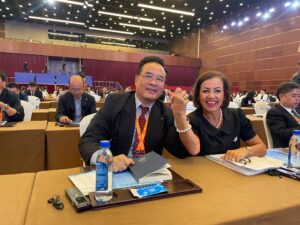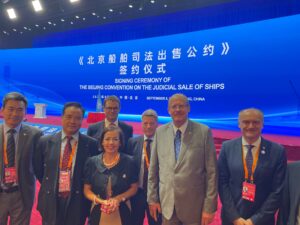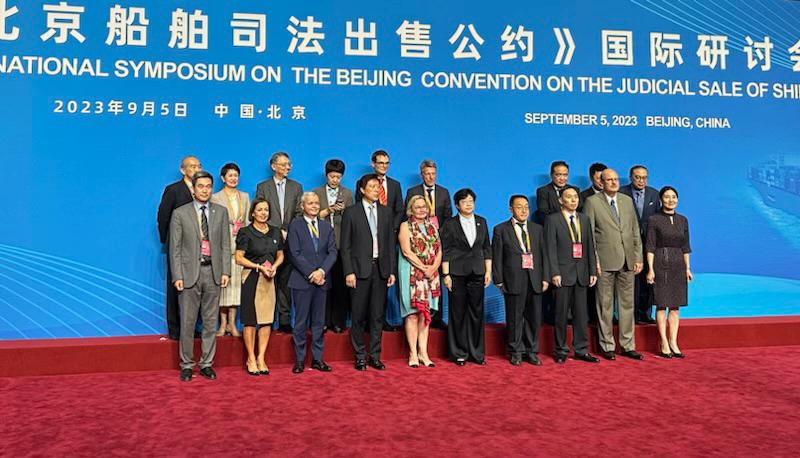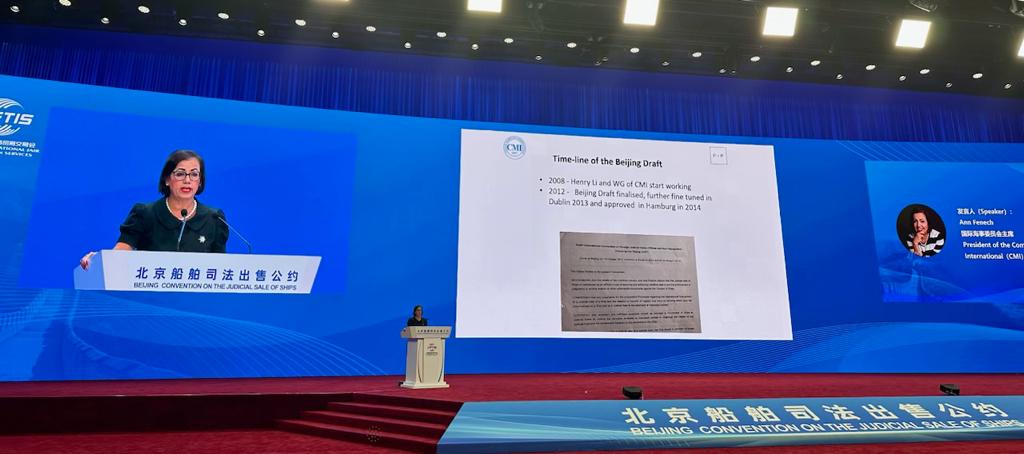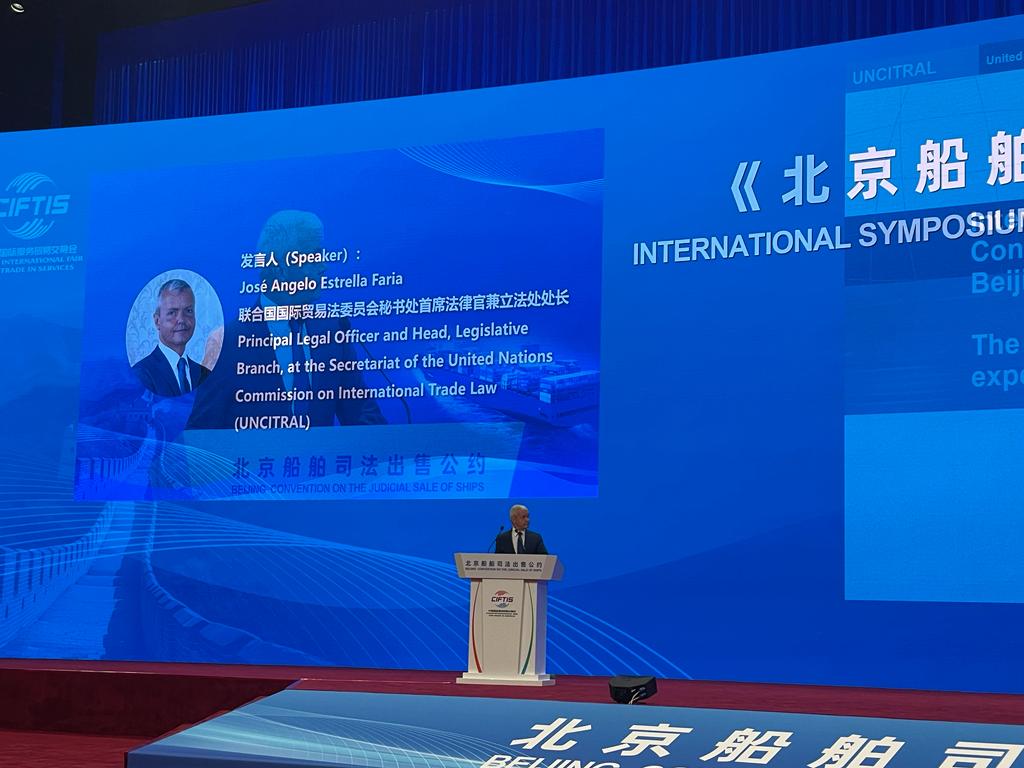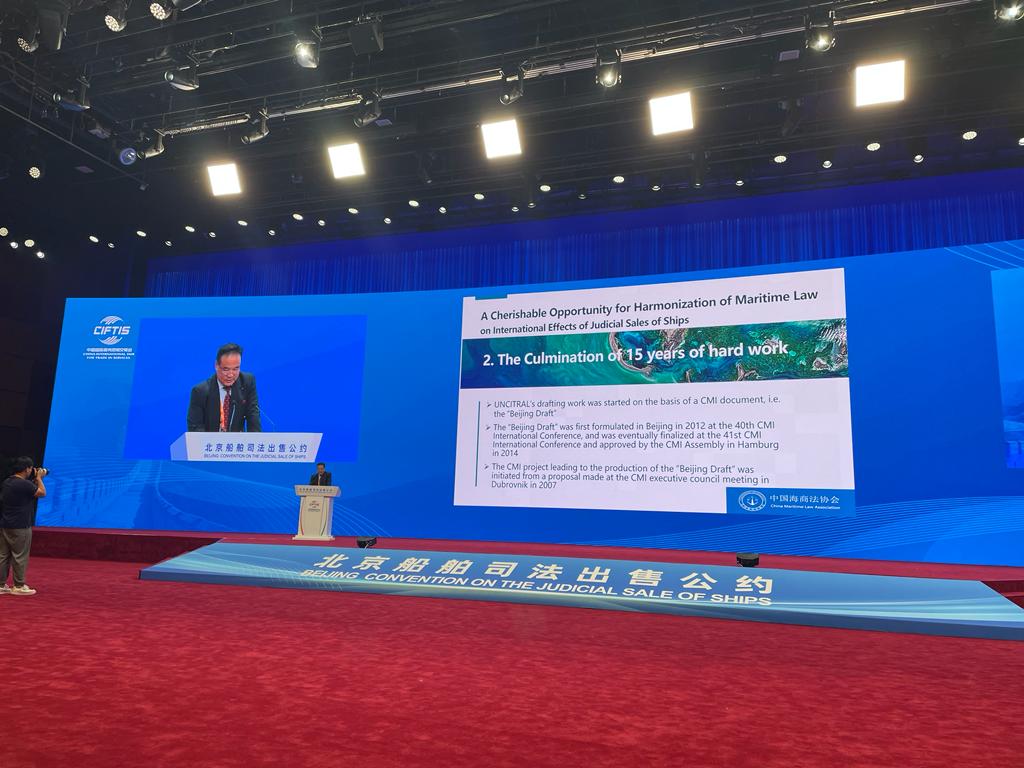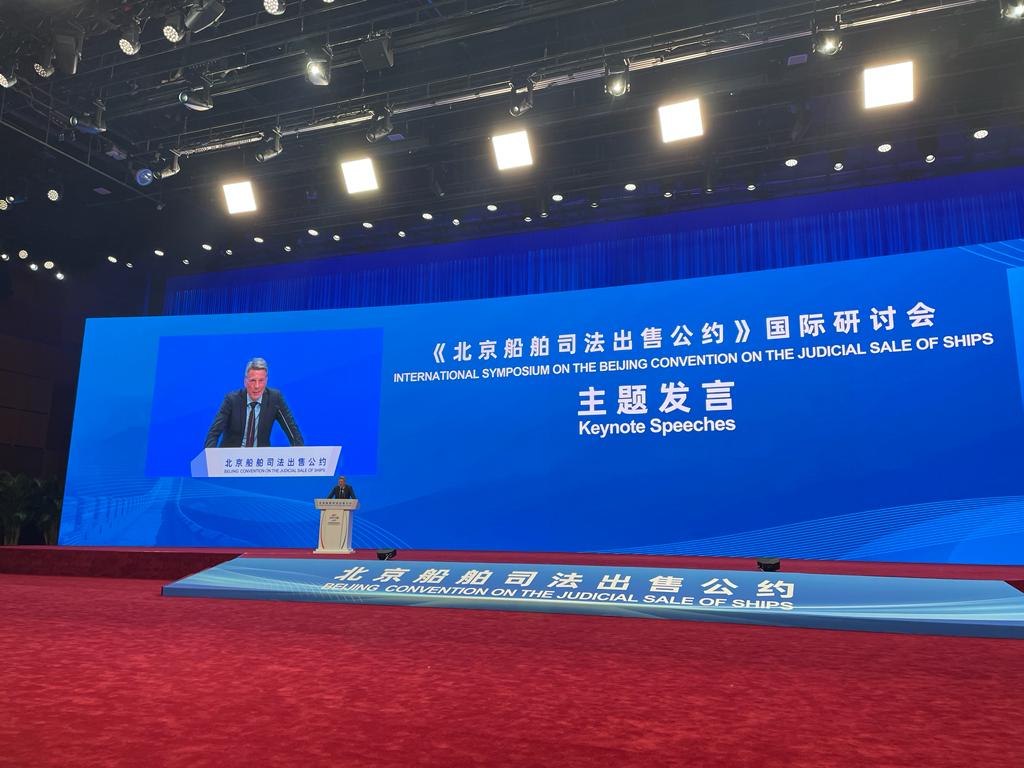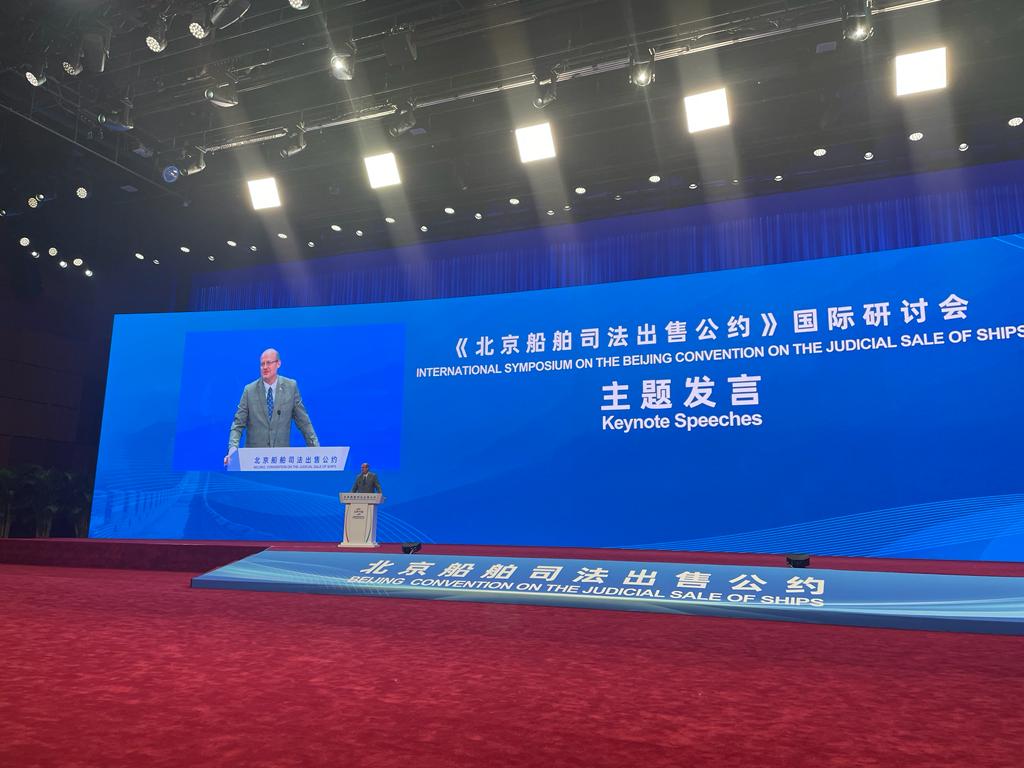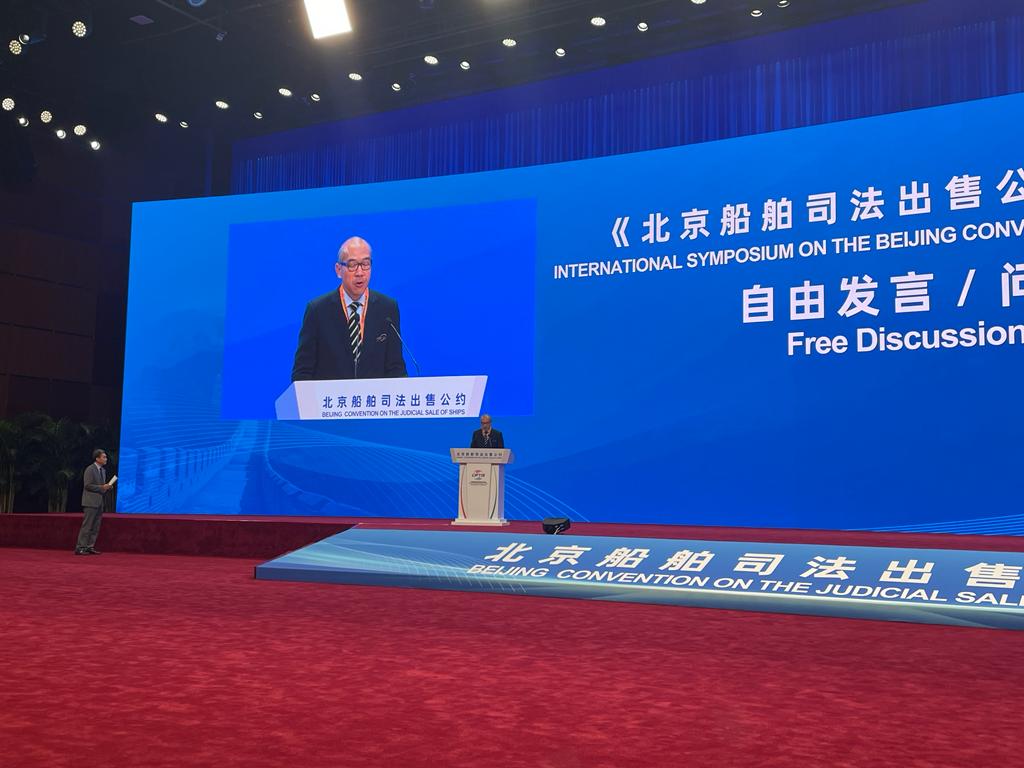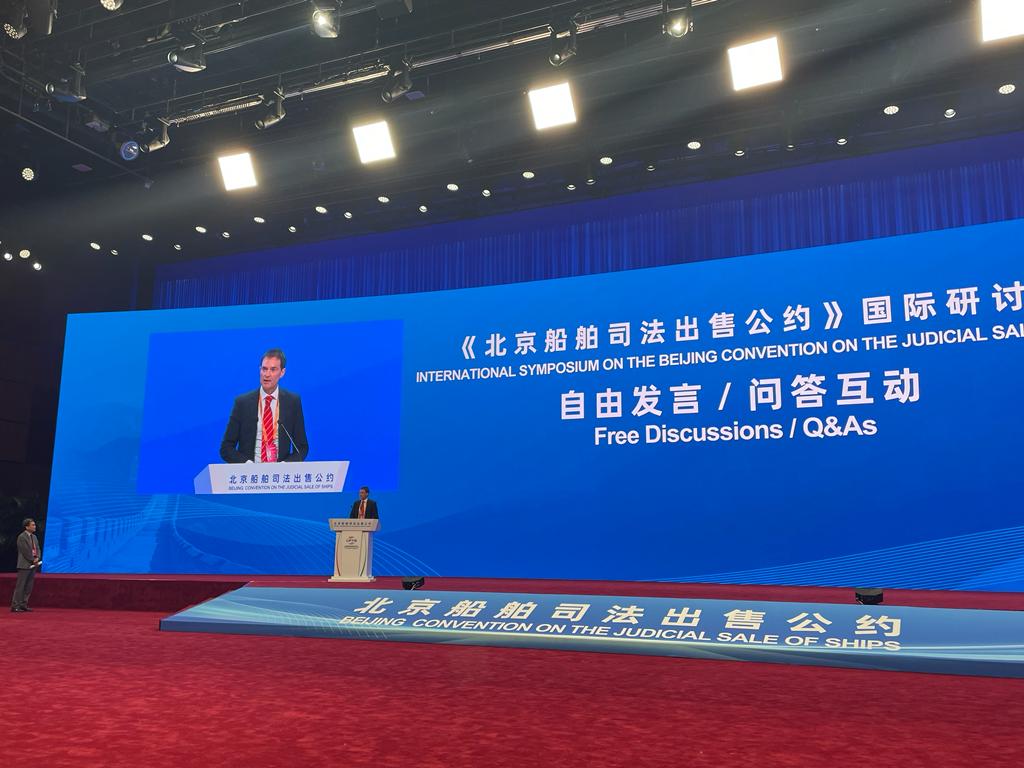The Convention on the International Effects of Judicial Sales of Ships Open for Signature
In the morning of the 5th of September in Hall A of the National Convention Centre in Beijing hundreds of people witnessed the signing ceremony organised by the Chinese Government and UNCITRAL of the Convention on the International Effects of Judicial Sales of Ships.
Fifteen States signed the Convention China, Burkina Faso, Comoros, El Salvador, Kirabati, Grenada, Honduras, Liberia, Sao Tomi and Principe, Saudi Arabia, Senegal, Siera Leone, Singapore, Switzerland and Syria.
It was a very special moment indeed for CMI and for those who have worked hard to see this day.
CMI was very well represented by Dr Ann Fenech in her capacity as President, Henri Li co-chair of the IWG on Judicial Sales, Administrator Lawrence Teh, rapporteur of the IWG on Judicial Sales Peter Laurijssen, Beiping Chu Exco member, Soren Larsen deputy secretary general BIMCO, consultative member of CMI, Jan de Boer, Legal Officer at the IMO consultative member of the CMI, George Theocharides representing WMU consultative member of the CMI and Dihuang Song Titulary member of the CMI. The convention seeks to bring stability and certainty to international trade.
Ann Fenech, President of the Comite Maritime International – Key Note Speech in Beijing
Honourable Judges, excellencies, honourable ministers, distinguished ladies and gentlemen.
Introduction – Unification of International Maritime Law, the CMI and UN Agencies
It is indeed my honour and privilege to be participating in this symposium only a few hours after the signing ceremony of the International Convention on the International effects of judicial sales of ships. Thank you for your kind invitation to attend and address this audience this afternoon.
Unification of International Maritime law, was, is and will remain, the very raison d’etre of the Comite Maritime International the CMI.
Louis Frank one of the co-founders of the CMI in 1897 is quoted as having stated:
“We have taken into consideration that the shipowner, the merchant, the underwriter, the average adjuster, the banker, the person who is directly interested, all take a preponderant part in our work; that the task of the jurist is to discern that which, among these divergent interests, is common to all; to discern what, among the diverse solutions, is the best to contribute one’s learning and one’s experience; but that in the final analysis, the jurist must hold the pen and that it is the man with the experience who must dictate the solution.”
This quote holds good today over 130 years later. The modus operandi of the Comite Maritime International in identifying problems and challenges, in forming international working groups made up of maritime lawyers from various jurisdictions and persons directly from the industry ensures workable solutions leading the CMI to be responsible for the initial drafting of the vast majority of international maritime Conventions.
Originally the Comite was the only international organization involved with the unification of international maritime law. It would draft conventions and present them to the Belgian Government who would organise diplomatic conferences related to subjects concerning maritime law.
In 1948 The Intergovernmental Maritime Consultative Organisation (IMCO) as the IMO was then called was established and the legal committee of IMCO was formed in 1968 following the major oil spill from the Torrey Canyon incident of 1967. The legal committee produced The CLC Convention of 1969 in which the CMI played a key role in its drafting.
In the meantime in 1964 the United Nations Conference on Trade and Development – UNCTAD, and in 1966, the United Nations Commission on International Trade Law – UNCITRAL, were created.
The CMI has since these dates enjoyed an excellent working relationship with all three organisations and others during which period to date it has continued to produce drafts of conventions which have then been taken up either by the IMO, UNCTAD or UNCITRAL.
What we are celebrating today ladies and gentlemen is a perfect example of the exceptional synergies and energies which exist between the Comite Maritime International and UNCITRAL. It is a historic day for the protagonists of the maritime and trading sector including ship owners, prospective purchasers of ships, ship financiers, crew, and creditors of vessels who demand and deserve to operate within a certain and robust regime.
The Convention
This new Convention aims to reduce the uncertainty when the free and unencumbered title provided to a purchaser of a ship in a judicial sale is not given its proper effect leading to instability, significant financial cost and lack of trust and confidence in judicial sales.
The Problem
In 2008 the President of the China MLA Professor Henry Li drew the attention of the CMI to the fact that there was regrettably, an increasing obstacle to the smooth conduct of international trade, an obstacle which was seriously interfering with the free and unfettered enjoyment of a ship by innocent purchasers who would have spent significant amounts of money to purchase vessels in judicial sales free and unencumbered, only to find their ships subjected to re-arrest by the vessel’s previous creditors acting in bad faith; obstacles in obtaining the vessel’s deletion from its old register and in obtaining the deletion of previously registered mortgages or hypothecs.
On their part the purchaser’s financiers who would have extended finance in the justified belief that they would be the only mortgagees suddenly find themselves facing old mortgagees with their security guaranteeing millions of Euro disappearing before their very eyes; the charterers of such arrested vessels would have their voyages interrupted and cargo owners would suffer delays in the delivery of their cargoes leading to further claims. The financial cost of all of this to the detriment of international trade could and can only be measured in hundreds of millions. Something had to be done about it.
After much work the CMI international working group chaired by Henry Li produced the Draft Convention on the International Recognition of Judicial Sales of Ships, known as the Beijing Draft which was finalised and approved by the CMI General Assembly in Hamburg in 2014 and from then on the CMI went about finding the Draft a home. It was in 2017 at the Commissions’ 50th session that the matter was brought to the attention of UNICTRAL, and it was suggested that an international colloquium be held for the purposes of gathering a cross section of the shipping industry, with a view to establishing whether or not the international shipping community felt there was a need.
A colloquium was held in my country – Malta – in February 2018. Attendees varied from members of the judiciary to representatives of ship owners, crew, service providers, ship brokers, ship financiers and industry experts. All agreed that the situations I have just described needed to be addressed – financiers of ships needed certainty, purchasers deserved peace of mind, registrars of ships needed objective criteria enabling them to give proper effect to such judicial sales.
The conclusions of the Malta Colloquium were contained in the Swiss Proposal to the Commission at its 51st session in 2018 by Alexander von Ziegler, past secretary general of the CMI, in his capacity as representative for Switzerland and the Commission was persuaded to take on the work which it allocated to working group V1 under the Chairmanship of Prof. Beate Czerwenka. There followed 5 extremely intensive meetings with the Draft Convention on the International Effects of Judicial Sales of Ships approved by the Commission in June 2022 and adopted by the General Assembly in December 2023 .
The various articles in the Convention before us have been drafted with a view to ensuring a fair and transparent arrangement which does not propose to interfere with the domestic law of the state where the judicial sale is held, but which provide reassuring criteria giving peace of mind to several interested parties ranging from the unfortunate owners of the distressed ships, to the purchasers of such ships and their financiers as well as the various creditors of such ships including the crew members.
The Convention in its first article sets the scene: “ This Convention governs the international effects of a judicial sale of a ship that confers clean title on the purchaser.”
Giving proper effect to the free and unencumbered title of a purchaser in a judicial sale goes a long way in ensuring that the best prices are paid for such ships by persons prepared to invest in them.
For instance, most regrettably in these situations crew are frequently left languishing for many months on board distressed vessels. What each and every seafarer wishes to see is the expeditious judicial sale of the vessel taking place in such a manner which would attract the best purchasers offering the best price. The seafarer appreciates that it is only if a free and unencumbered title is secured that a purchaser will be prepared to pay good money for the vessel which will in turn give the crew member the best chance of getting out of the miserable situation he finds himself in, of getting paid and of being repatriated and reunited with his family.
The Convention before us is an uncomplicated and relatively straight forward document which provides in article 6 that a judicial sale for which a certificate of judicial sale referred to in article 5 has been issued shall have the effect in every other State party of conferring clean title to the ship on the purchaser.
In my humble opinion, Article 4 which provides for a Notice of the Judicial Sale to be given to numerous interested parties as well as the Repository which is the International Maritime Organisation, effectively guarantees that any person can at the touch of a button by means of the IMO Gisis platform, find out if a vessel is going to be sold in a judicial sale, and the certificate of judicial sale issued at the request of the purchaser by the court or authority under whose auspices the judicial sale was held, must attest to the fact that the vessel was sold free and unencumbered.
The effect of the Convention
The Convention we have before us dictates that on the production of such a certificate of judicial sale, registrars of ships of state parties MUST delete existing mortgages or registered hypothecs as well as the ship from their register if requested by the new purchaser and / or must register the ships in the hands of the new owners. On production of such a certificate of judicial sale, judges in jurisdictions where the vessel finds itself arrested by old creditors of the vessel MUST release the ship of dismiss an application for arrest.
Ratification of this Convention by States would provide such states with a significant advantage in that it will enrich the value of the judicial sales processes in such jurisdictions.
Purchasers of second hand tonnage in judicial sales will start to pursue judicial sales in state parties because they will obtain peace of mind in trading in and navigating to other state parties which have ratified the Convention.
Financiers have expressed the view that they could reach the point of agreeing to finance vessels only if they are sold in judicial sales held in countries which are state parties. They also envisage a scenario where financiers would only agree to financing ships purchased in judicial sales if they were registered with flag states that were in fact state parties to the convention.
We would suggest that states have everything to gain and absolutely nothing to lose by ratifying this convention.
Bright Star
Ladies and gentlemen the problems associated with the failure to give proper effect are real and still with us. In June 2018 a few weeks before the 51st Commission session in New York, The Bright Star purchased by Greek owners for 10.3 million dollars in a judicial sale in Jamaica six months earlier was re-arrested by an old creditor of the vessel whilst in Maltese territorial waters. She was under charter carrying a full cargo of wheat from Kavkaz to Venezuela. Notwithstanding the fact that the Maltese Merchant Shipping Act prohibited this from happening, our efforts on behalf of the new owners to have the arrest lifted expeditiously by using summary proceedings failed. The charter was suspended and put off hire, the cargo delayed, the owners had to put up security to obtain the release of the vessel and had to commence an action on the merits claiming damages for an illegal arrest. The purchaser found himself involved in no less than 74 sets of judicial acts with their club investing huge amounts of money and human resources to overcome this very disruptive situation. Their financiers seriously concerned about the fact that an old creditor was seeking to enforce an old claim against an asset which was securing the money they had advanced to the purchaser to enable him to purchase the vessel in the judicial sale. The cost of this ordeal ran into hundreds of thousands of Euros whilst taking 4 years to be resolved. The first court eventually in May 2021 held in favour of the new purchasers declaring the arrest illegal and ordered the arresting party to pay damages. The defendants appealed and the court of appeal confirmed the judgement of the first court in January of this year, one month after the UN General Assembly adopted this convention.
Had this Convention been in existence at the time, and if Jamaica and Malta had ratified this convention, the vessel would have been released from the arrest within hours of the presentation of the certificate of judicial sale and would have avoided 4 years of human resources dedicated to pursuing this matter, serious disruption, uncertainty and the substantial expenses incurred.
I will conclude by thanking most sincerely, the Secretariat at UNCITRAL represented here today by Madame Joubin Bret and Mr. Jose Angelo Estrella Faria and their team for their dedication and meticulous attention to detail, their perseverance and their significant contribution towards ensuring that consensus was reached amongst the delegations on the Draft wording. It was my absolute privilege and my pleasure to co-ordinate the CMI efforts at working Group V1 during these sessions and it was an even greater privilege to work along side Mr. Jose Angelo Estrella Faria, the Chair of working Group V1, Beate Czerwenka and their teams. The CMI is equally thankful to all the delegations which took part in the deliberations and contributed significantly to the debate and conclusions reached on the Draft; The CMI is also indebted to the International Maritime Organisation for coming forward and agreeing to be the Repository of the notices and certificates of Judicial Sales, and last but not least on behalf of the Comite Maritime International I would like to thank the Ministry of Commerce of China for the organisation and hosting of the signing Ceremony and the China Maritime Law Association, UNCITRAL, the Supreme Peoples Court of the Peoples Republic of China and Dalian Maritime University, for co-organising this Symposium – the culmination of a process which proves how with good will, determination and truly effective team spirit, countries with different legal systems, diverse cultures and divergent views can ultimately come together and produce a treaty, this treaty on the international effects of judicial sales of ships for the benefit of the international shipping and trading community.
Thank you
Jose Angelo Estrella Faria, the Principal Legal Officer of UNCITRAL- Speech in Beijing
I should begin by thanking the Supreme People’s Court for the kind invitation to deliver a keynote speech at the International Symposium on the Beijing Convention on the Judicial Sale of Ships being convened on the same day of the ceremony hosted by the People’s Republic of China and organized by the Ministry of Commerce of China in cooperation with the United Nations office of Legal Affairs, at which [seven] countries have signed the United Nations Convention on the International Effects of Judicial Sales of Ships, which we now may officially the “Beijing Convention on the Judicial Sale of Ships”.
The new convention is not the first incursion of the United Nations Commission on International Trade Law (UNCITRAL) into maritime law. Neither was it the first occasion of cooperation with the Comité Maritime Internationale, also represented at this symposium today by its President Ann Fenech, who played a crucial role in the negotiation of the Beijing Convention. The cooperation between UNCITRAL and the CMI in this project was a particularly fruitful one, allowing the project to be completed within an unusually short period for an international convention.
We will hear about the Convention from the learned speakers this afternoon but allow me to briefly illustrate its purpose and architecture.
In most States, courts have the authority to order the sale of a ship to satisfy a legal claim. Such a claim is typically brought against the ship or shipowner to foreclose a ship mortgage (in the event of default in repayment) or to enforce a maritime lien against the ship. The judicial sale procedure is typically preceded by the arrest of the ship.
While the international community has achieved significant progress in harmonizing rules on the arrest of ships, much less progress has been achieved in harmonizing rules on the judicial sale of ships. As such, it remains for each State to prescribe the rules governing the procedure and legal effect of judicial sales ordered by its courts.
Although in many States the judicial sale has the legal effect of conferring “clean title” on the purchaser (that is, it extinguishes all rights and interests that were previously attached to the ship, including mortgages and maritime liens), this is not the rule everywhere. It also remains for each State to prescribe the rules governing the legal effect within its jurisdiction of foreign judicial sales.
The original proposal presented by the CMI to UNCITRAL in 2017 drew attention to problems arising around the world from the failure to give recognition to foreign judgments ordering the sale of ships. It was stated that a short, self-contained instrument along the lines of the Convention on the Recognition and Enforcement of Foreign Arbitral Awards (the 1958 New York Convention) could provide a solution to those problems.
UNCITRAL showed interest for that proposal and requested the CMI to develop it further. UNCITRAL and the CMI held a colloquium in Malta, in February 2018, involving government officials, academia and representatives of the shipping industry. The conclusions of the colloquium were summarized in an additional proposal submitted to the fifty-first session of UNCITRAL, in 2018, by the governments of Malta and Switzerland. UNCITRAL agreed on the importance and timeliness of the project and assigned it to a working group.
The Working Group considered the topic for the first time at its thirty-fifth session, in May 2019, and agreed to use the draft convention on the recognition of foreign judicial sales of ships approved by the CMI Assembly in Beijing in 2012 (known as the “Beijing Draft”) as a basis for its discussions. Work proceeded thereafter in five more sessions of the Working Group for each of which the UNCITRAL secretariat prepared a revised draft (five altogether).
Those negotiations were open to all Member States of the United Nations and counted with the active participation of delegations with expertise in maritime matters and the input of maritime industry stakeholders. After the last session of the Working Group, in February 2022, the UNCITRAL secretariat circulated the revised draft to all Governments and relevant international organizations for comment. The Commission considered the revised draft and the comments received at its fifty-fifth session, in 2022, when it finalized the text and submitted it to the General Assembly for adoption.
The United Nations General Assembly adopted the Convention at the 47th plenary meeting of its 77th session, on 7 December 2022. The General Assembly authorized the convening of a ceremony for the opening for signature of the Convention in Beijing, following the generous invitation by the Chinese Government, and recommended that the Convention be known as the “Beijing Convention on the Judicial Sale of Ships”.
The Convention establishes a harmonized regime for giving international effect to judicial sales, while preserving domestic law governing the procedure of judicial sales and the circumstances in which judicial sales confer clean title. The Convention takes a pragmatic approach to address a problem of practical importance by dealing with the key issues for which uniformity is desirable, namely:
- the mandatory notification of judicial sales to interested parties, including ship registry,
- the introduction of a standard certificate to provide a basis for international recognition,
- the deregistration or transfer by the ship registry at the request of the purchaser,
- the prohibition of actions to arrest the ship for claims arising from a pre-existing right or interest,
- the exclusive jurisdiction of the courts of the State of judicial sale to hear challenges to the judicial sale.
Accordingly, the Convention leaves it for the applicable law to determine
- the procedure or legal effect of a judicial sale within the State of judicial sale,
- the recognition and relative priority of maritime liens,
- the time of completion of sale and transfer of property, and
- the distribution of proceeds and grounds for avoidance of judicial sales.
The working group considered extensively how to deal with judicial sales that do not confer clean title, as is the case in some countries where certain types of pre-exiting charges survive. It was agreed that the only sales that confer clean title could have international effects under the Convention. As in some countries this may not be known until the time the sale is completed, that element is not part of the definition of judicial sales, but clean title will be a condition precedent for the issuance of a certificate under article 5, which in turn is a requirement for the sale to have international effects.
The working group also discussed at length the notice requirements under the Convention. There was wide agreement that notice was importance to give interested parties the opportunity to file their claims with the competent court. To widen the reach of such notice, the Convention provides for its publication by an international repository, which will be maintained by the International Maritime Organization.
An important group of negotiating States was reluctant to assume an obligation to give effect to foreign sales if they were not satisfied that the country from which the certificate emanated had duly notified the interested parties and afforded them an opportunity to participate in the proceedings leading to the judicial sale and protect their interests. The opposing view was that such safeguards already existed under domestic law and any qualification of the obligation to give effect to a foreign sale would only serve to invite litigation and erode the value of a certificate. The compromise found in article 4, paragraph 1, takes account of the need for finality and legal certainty, while recognizing that appeal and review procedures are an integral part of the understanding of due process underlying the convention.
Upon completion of the judicial sale – which is determined in accordance with the law of the State of judicial sale – the court that conducted the judicial sale or other competent authority issues a certificate of judicial sale to the purchaser if:
- the judicial sale conferred clean title to the ship under the law of the State of judicial sale and
- the sale was conducted in accordance with the requirements of that law and the requirements of this Convention.
Both requirements give comfort to the purchaser, but especially to the registry or any other person asked to act upon the certificate, that the sales was done in proper order and can have the international effects provided in the Convention.
To increase transparency and uniformity, the Convention introduces a model certificate listing the required minimum information. The certificate of judicial sale must be transmitted promptly to the repository
Article 6 sates the basic rule of the Convention, namely that a judicial sale conducted in one State Party which has the effect of conferring clean title on the purchaser has the same effect in every other State Party (article 6). The basic rule is subject only to a public policy exception (article 10).
The Convention regime prescribes additional rules which establish how a judicial sale is given effect after completion. The first is a requirement that the ship registry deregister the ship or transfer registration at the request of the purchaser (article 7).
The second rule is a prohibition on arresting the ship for a claim arising from a pre-existing right or interest (article 8). The third rule is the conferral of exclusive jurisdiction on the courts of the State of judicial sale to hear a challenge to the judicial sale (article 9).
To support the operation of the regime, enhance transparency and facilitate the access to information concerning judicial sales of ships, the Convention requires that notices of judicial sale, certificates of judicial sale and court decisions annulling or suspending a judicial sale be transmitted to the online repository which is freely accessible to any interested person or entity (article 11).
Ladies and gentlemen,
For several years now, international lawyers have noticed a decline in multilateral treaty-making, in terms of a lower rate of both adoption and ratification of multilateral treaties. There are several explanations for this “treaty fatigue”, including recent structural changes in the world political and economic order that emerged after the Second World War and a preference for flexibility in the form of non-binding instruments such as guidelines, declarations or memoranda of understanding.
Of course, treaty-making is a complex and time-consuming process, and States carefully ponder their interest before embarking in international negotiations the outcome of which may at times be unpredictable. Yet, treaty-making remains a central tool of international relations and important treaties are still being negotiated at the United Nations. This is particularly true for treaties in more specialized and less politically controversial fields.
The Beijing Convention was completed in record time for an international treaty, and despite the interruptions and delays caused by the pandemic. To a large extent, this was the result of the excellent cooperation and division of labour between UNCITRAL and the CMI. To a large extent it was also a reflection of the narrow and sharply defined scope of the Convention.
Also, the early efforts to engage IMO in the process and to foresee a role for IMO in the application of the Convention helped increase support and create an operational platform for the Convention in the form of the repository.
Informal consultations held between sessions and during formal meetings proved to be extremely useful to bridge gaps and reach consensus on difficult issues, and lastly, the Secretariat’s neutral position allowed it to help building consensus by preparing revisions to the text and proposing language balancing diverging positions.
We are persuaded that that the Convention will increase legal certainty and predictability for purchasers of ships and contribute to reducing forum shopping and abusive litigation.
The enhanced legal certainty for purchases is likely to result in better prices being paid at judicial sales, leading to higher sales proceeds to satisfy ship and shipowner’s creditors.
The introduction of a standard certificate of judicial sale, provides a clear, simple and predictable uniform process to guide ship registries in handling requests for ship deregistration and related actions following ship purchase in a judicial sale.
Ship registries and their equivalent are not required to investigate the circumstances of the sale. At the same time, the certificate of judicial sales gives comfort that interested parties were notified and had a fair chance to participate in the sales process. The ship registry is shielded against risk of litigation, as any claims related to the sale and the issuance of the certificate must be handled by the courts of the State of judicial sale.
As you can see, many factors contributed to the success of the Convention, but I should like to conclude by acknowledging the invaluable contribution of the China Maritime Law Association and the Chinese experts who participated in this process – sometimes joining us remotely in the middle of the night during the pandemic. I pay my respects to them in the person of the learned and tireless Vice-President of the China Maritime Law Association, Professor Henry Li. From the original Beijing Draft to the final Beijing Convention, their contribution to this process was invaluable.
I would like to place on record our gratitude to them and to the highly professional and generous support provided by the Ministry of Commerce of China, which made it possible for us to meet here today and celebrate this important achievement.
Thank you for your attention.
Henry Hai Li,vice-president of China Maritime Law Association, and a Titulary Member of CMI – Speech in Beijing
- Introduction
The signing ceremony of the United Nations Convention on the International Effects of Judicial Sales of Ships (the “Convention”) was held this morning here in Beijing. We have witnessed 15 states signed the Convention. As a representative of China Maritime Law Association, I am happy to see that China is one of the states having signed the Convention this morning. The Convention now is open for signature, and will enter into force 180 days after it is ratified, accepted, approved or acceded by just 3 States. It is my hope that China will be one of the first 3 states which will trigger the 180 days to start to count.
- The culmination of 15 years of hard work
In the Resolution adopting the Convention, UNCITRAL is commended for preparing the draft convention. As a matter of fact, UNCITRAL was first proposed by CMI to take up this topic at its 50th session (Vienna, 3‑21 July 2017). And, later at its 51st session (New York, 13-17 May 2019), it was agreed that the topic of judicial sales of ships should be added to the work programme of the Commission. Subsequently, at its 35th session (New York, 13–17 May 2019) the WG VI considered the topic for the first time, and decided that the “Beijing Draft” would provide a useful basis for discussion. After another 4 sessions, the WG VI at its 40th session (New York 7–11 February 2022) completed a further review and consideration of the draft convention on the basis of the 5th revision of the “Beijing Draft”. After that, the Commission at its 55th session (New York, 27 June–15 July 2022) considered the revised draft and finalized the text and (on 30 June 2022) approved the draft convention and submitted the same to the General Assembly for adoption.
As mentioned above, UNCITRAL’s drafting work was started on the basis of a CMI document, i.e. the “Beijing Draft”. It is worth noting that the “Beijing Draft” was first formulated in Beijing in 2012 at the 40th CMI International Conference, (as known the conference was hosted by China Maritime Law Association and CMI). The draft was later revised at the CMI Colloquium in Dublin in 2013, and was eventually finalized at the 41st CMI International Conference and approved by the CMI Assembly in Hamburg in 2014. In addition, it is also worth noting that the CMI project leading to the production of the “Beijing Draft” was initiated from a proposal made at the CMI executive council meeting in Dubrovnik in 2007 and followed by setting up CMI IWG, preparing Questionnaire, analysing responses from national maritime law associations, drafting instrument, etc.
In summary, it took some 15 years to complete the journey from a proposal to a UN Convention. In other words, the Convention is the culmination of 15 years of hard work.
- The Purpose of the Convention
Article 1 on purpose reads: “[T]his Convention governs the international effects of a judicial sale of a ship that confers clean title on the purchaser.” Obviously, this article makes it clear what this Convention is intended to regulate.
It goes without saying that under this Convention a judicial sale is considered as a legal fact, but not something else, such as a court decision or arbitral award. It follows that the Convention is concerned only with the effects of the legal fact that are produced by operation of law, and thus not with the effects of the court order or judgment ordering, approving or confirming the judicial sale nor the effects of the court judgement or arbitral award for enforcement of which the judicial sale is conducted.
Further, as conveyed by the language of article 1, this Convention is concerned only with the “effects” of a judicial sale, and not with the judicial sale itself, including the conduct or procedure of the judicial sale; Furthermore, this Convention is concerned only with the international effects in State Parties other than the State of judicial sale, and thus not with the domestic effects of the judicial sale in the State of judicial sale.
Bearing in mind the fact that not in all jurisdictions a judicial sale will always confer clean title, article 1 also makes it clear that the Convention is concerned only with those judicial sales that confer “clean title”. In other words, if a judicial sale does not confer clean title on the purchaser, the Convention would not regulate the effects of such a judicial sale.
It is worth mentioning that the term “clean title” together with other key terms contained in article 1, namely “judicial sale”, “ship”, “purchaser” are defined in article 2 of this Convention, but here I shall only emphasize the definition on “clean title”, which is provided to mean “title free and clear of any mortgage or hypothèque and of any charge”. In addition, in light of the definitions on “mortgage or hypothèque” and “charge”, the term “clean title” may be comprehended to refer to title free and clear of any right whatsoever and howsoever arising which may be asserted against a ship, whether by means of arrest, attachment or otherwise; Clearly, such kind of rights would include for example a maritime lien, lien, encumbrance, right of use or right of retention, mortgage or hypothèque on the ship. In short, clean title to a ship means title free and clear of any right, which may be asserted against the ship.
- The International Effects of a Judicial Sale of a Ship
Article 6 on international effects of a judicial sale reads: “[A] judicial sale for which a certificate of judicial sale referred to in article 5 has been issued shall have the effect in every other State Party of conferring clean title to the ship on the purchaser.”
It is believed that this article contains the basic rule of this Convention, i.e. a judicial sale conducted in one State Party with an article 5 certificate issued shall have the effect of conferring clean title on the purchaser in every other State Party. This means that for a judicial sale to have international effects, it is triggered by the issuance of an article 5 certificate, and no other special procedure or document is required. In other words, once an article 5 certificate is issued, the domestic effects produced by operation of the law of the State of judicial sale, shall be allowed to extend into other State Parties by operation of this Convention, in particular, the provisions of article 6. In addition, this also means that only the effect of conferring clean title to the ship on the purchaser may extend from the State of judicial sale into other State Parties, even if various effects may have been produced by operation of the law of the State of judicial sale.
It is true that article 6 is only concerned with the effect of a foreign judicial sale in conferring clean title on the purchaser. However, the operation of article 6 may be manifested in a number of ways, including in action taken on the registration of the ship under article 7, action on the prohibition of arrest of the ship under article 8, etc.
As can be seen from the above, for implementation of the basic rule of this Convention as contained in article 6, every State Party shall bear a treaty obligation to accept or allow the effect of a foreign judicial sale conducted in another State Party of conferring clean title to extend into its jurisdiction. In my view, this is the primary treaty obligation imposed by this Convention upon the State Parties. On the other hand, it is worth noting that the said basic rule as contained in article 6 is made subject to the public policy exception, which is provided for in article 10 of this Convention.
- Conclusion
As a new baby of the international maritime law family, the Convention is designed to solve the practical and real problems that are encountered in international shipping and trade, and this is the first time that the international community made a milestone achievement in harmonizing the rules of maritime law in this particular area. Bearing in mind that it took some 15 years from a proposal to a UN convention, we have no reason not to cherish the enthusiasm, wisdom, efforts and hard work, which have been contributed by so many people, including a lot not attending here today. Time will tell the Convention offers a cherishable opportunity for harmonizing the rules of maritime law in relation to international effects of judicial sales of ships.
Last but not the least, as a representative of China Maritime Law Association, I am proud of (1) the signing ceremony of this Convention being held in Beijing and (2) the Convention being recommended to be known as the “Beijing Convention on the Judicial Sale of Ships”, as it is the first time in the history of the United Nations. And, in my view, it is also a sort of acknowledgement of the contributions to the birth of this Convention made by the Chinese maritime law circles being represented by China Maritime Law Association.
Søren Larsen, Deputy Secretary General at BIMCO- Speech in Beijing
Let me first of all extend a warm” thank you” to the China Maritime Law Association for having invited me to the Signing Ceremony and Symposium of the United Nations Convention on International Effects of Judicial Sales of Ships that was held today.
It is great to be back here in Beijing; I was last here several years ago well before COVID visiting one of the biggest shipyard groups in the world, CSSC, to discuss standard terms for the new building of ships. I am now here again in connection with a somewhat different but no less important matter.
In 2014 CMI concluded several years of hard work when it signed off the draft Convention on Judicial Sales of Ships in 2014 also referred to as the Beijing draft. BIMCO always follows closely what is going on within CMI because much of the work that CMI do is related to or somehow relevant for what BIMCO is doing and we have in the past worked closely together on various projects such as the drafting of the Rotterdam Rules. But unlike the Rotterdam Rules we were (to begin with) never really involved in the work on the draft Judicial Sales Convention partly because it was not a matter that we thought would be of immediate and real interest to our membership.
But then came the MALTA Colloquium in 2018. I was invited by CMI to join what should prove to be a bit of a turning point for BIMCO as regards our engagement in the Judicial Sales Draft Convention. First, it was an extremely well attended Colloquium, and it was a bit of an eye opener for me, personally, to see how many relevant stakeholders there are when a ship is sold as a judicial sale. It was also interesting to learn during the Colloquium what sort of problems parties involved in a judicial sale can get into when judicial sales had not been recognised cross borders. But what really made a difference was that many of those entities getting into problems were the very same entities that BIMCO represent – i.e., the shipowners, whether acting as buyers, sellers, or creditors.
So, I left Malta somewhat wiser than when I first arrived and now my job was to persuade BIMCO’s rather large and influential Documentary Committee which is the overarching body as regards all contractual and related matters within BIMCO, that this was something that the organisation should engage in and lend its full support to. I knew that would be a challenge also because the draft Convention seemed to be in a little vacuum not knowing if a body, like UNCITRAL would take it onboard turning it into a convention.
However, together with Peter Laurijssen, who is also here today and who is representing Belgium on BIMCO’s Documentary Committee and CMI’s President at the time, Stuart Hetherington, we managed to persuade the Documentary Committee at a meeting in May 2018 that BIMCO should throw its weight behind the draft Convention trying to persuade UNCITRAL to take it onboard.
And let me just mention some of the reasons why BIMCO decided to lend all its support to the Draft Convention.
Firstly, it did help that BIMCO shares long standing and close relations with CMI. Both CMI and BIMCO work for the same noble purpose and that is to achieve legal certainty through harmonization. The only difference is that whereas CMI is trying to harmonize at the regulatory level, BIMCO as the world leading organisation when it comes to contracts and clauses, is trying to do harmonisation at the contractual level.
And harmonizing at the regulatory and contractual level often go hand in hand since regulations in whatever shape they may take often have a knock-on effect in commercial contracts where BIMCO will then need to consider; how do we balance the responsibilities and liabilities flowing from the regulations into the commercial contracts in a fair and equitable manner. The most recent example is IMO’s MARPOL regulations on Carbon Intensity Indicators better known as CII and where BIMCO was seriously challenged in trying to provide a fair allocation of responsibilities and liabilities between the owners and time charterers as regards CII.
So, in effect, an international legal framework dealing with the judicial sale of ships goes to the very roots of BIMCO and what we stand for as an organisation and our long-held view that a truly global industry, such as shipping, depends on global rules.
Secondly, and most importantly the Documentary Committee realised, as I did when I joined the Malta Colloquium, that there are many more angles to a judicial sale than that of a defaulting shipowner whose ship is being sold. A scenario that often has a negative connotation to it because one imagines a defaulting shipowner and the securing of claims against the shipowner whereas the reality is that there is often a shipowner at the other end as well, i.e., the one who is purchasing the ship. Quite often shipowners are creditors with claims against the auction revenue of the ship sold in a judicial sale and legal certainty leads to higher auction revenue and leaves the creditor with a higher chance of a successful debt recovery.
So, while the Documentary Committee was somewhat reluctant if BIMCO should engage in the work in the draft Judicial Sales Convention to begin with, it turned around and gave its green light for BIMCO to engage.
We were extremely lucky that we had an expert on judicial sales of ships in the Documentary Committee namely, Peter Laurijssen, who was willing to represent the International Chamber of Shipping in the UNCITRAL Working Group on Judicial Sale of Ships and speak on its behalf but in close coordination with BIMCO. So, both ICS and BIMCO had a clear and consistent voice during the UNCITRAL Working Group proceedings.
When CMI celebrated its 125 years anniversary in Antwerp in October last year I said” We are now reaching the finishing line on what is a well drafted, broadly acceptable, and legally sound international instrument. For the same reason we hope that the UNCITRAL General Assembly will approve the draft Convention and that it will quickly gain wide acceptance – and you can count on BIMCO’s support in promoting it”.
Now after the UNCITRAL General Assembly approved the draft Convention last year and with the signing ceremony having taken place this morning here in Beijing you may now expect me to say” that we have now passed the finishing line on what is a well drafted and broadly acceptable and legally sound international instrument” but I am not. We are not there yet and there is still work to be done. We must all do our part to promote the Judicial Sales Convention to get it accepted across the board because only then will the job be done. But as I said in Antwerp last year; you can count on BIMCO’s support.
Let me finish by, again, thanking the China Maritime Law Association for having invited BIMCO to join the signing ceremony and legal symposium but most certainly also those with whom we have worked closely with in the process. CMI who is represented here today by their President, Ann Fenech, and who were instrumental in bringing BIMCO onboard in the process, ICS with whom we have shared close relations for many years and not least, Peter Laurijssen, who did a sterling job for and on behalf of BIMCO.
Your Excellencies, Ladies and Gentlemen, Distinguished participants,
First of all, on behalf of IMO Secretary-General Ki-tack Lim, I would like to express IMO’s gratitude for the invitation from the Supreme People’s Court of the People’s Republic of China, to attend the Signing ceremony and to deliver a keynote speech in the international Symposium.
IMO is the United Nations specialized agency with responsibility for maritime safety, maritime security, the efficiency of shipping and the prevention of marine pollution by ships. As such, IMO is responsible for a range of Conventions, international legal instruments, and comprehensive guidance, many of which are related to issues of liability and compensation for damage caused in connection with maritime transportation.
The IMO Legal Committee, at its 103rd session in June 2016, noted a document (LEG 103/11/3) which was submitted by China, the Republic of Korea, and the Comité Maritime International (CMI), proposing the inclusion of a new output to develop a new instrument on the foreign judicial sales of ships and their recognition based on a draft convention prepared by CMI, in order to ensure that the purchaser of a ship in a judicial sale is obtaining a clean title to the ship, free of any pre-existing mortgages, liens, or other encumbrances.
While there had been support for the proposal and appreciation for the information provided, the Legal Committee did not accept it at that point in time. The Committee noted that Member States could, of course, raise the subject again at a later session of the Committee under the standing agenda item “Work programme”. The Committee noted that CMI intended to bring the matter to the attention of other relevant international forums and that it might report back to the Committee at a later stage (LEG 103/14, paragraphs 11.13 to 11.15).
Following this decision by the Committee, CMI made a similar proposal to the United Nations Commission on International Trade Law (UNCITRAL) in 2017, and a decision to add it to the UNCITRAL work programme was taken in 2018. Since then, the draft instrument has been allocated to UNCITRAL Working Group VI, which considered it at various sessions in New York and in Vienna. The IMO Secretariat attended these sessions of Working Group VI and was also present at the 55th Commission session of UNCITRAL, which decided to submit to the General Assembly the draft instrument to adopt, at its seventy-seventh session in 2022, the ‘United Nations Convention on the International Effects of Judicial Sales of Ships’.
The convention establishes a harmonized and simplified regime for giving international effect to judicial sales of ships. To facilitate the operation of the recognition regime, and to safeguard the rights of parties with an interest in the ship, the convention provides for two separate instruments to be issued in the State of judicial sale: (1) a notice of judicial sale and (2) a certificate of judicial sale. The convention establishes a repository to receive these instruments from States parties and to publish them for the information of all interested parties. The Secretary-General of IMO is designated as the repository under the convention. The IMO Legal Committee has invited the IMO Secretariat to make the necessary arrangements to host the repository as a dedicated module on IMO’s Global Integrated Shipping Information System (GISIS) platform.
IMO supports the establishment and maintenance of an online repository of notices and certificates of judicial sale received from States parties under the Convention. Providing access to these instruments via the module is of practical benefit for international shipping and will promote the visibility of GISIS in the maritime sector.
The project will expand the use of GISIS among a wider group of stakeholders within the global maritime community. Specifically, by promoting the dissemination of information on the judicial sale of ships, the additional GISIS module supporting the repository mechanism will not only be of practical benefit to shipowners and creditors, including lienholders and ship financiers, but also of interest to researchers and analysts in the maritime sector.
The project implements Resolution A.1029(26), by which the IMO Assembly encouraged IMO organs, international organizations, and all other stakeholders of the global maritime community to raise awareness of GISIS, not only for compliance with mandatory reporting requirements, but also as a tool to support research work and the adoption of international and national policies on maritime safety and security and environmental protection.
As stated in the explanatory note accompanying the Convention, the repository function is “purely informational” and the Convention “imposes no requirement on the repository to review or ensure the accuracy or completeness of instruments transmitted for publication nor any requirement to translate them for publication”. Accordingly, IMO bears no responsibility or liability regarding the content of the notifications and certificates transmitted by States parties using the module. This should be made explicitly clear from the outset.
As also stated in the explanatory note, “the convention purposefully does not prescribe how the repository performs its function but rather leaves it to the repository to put in place procedures for the receipt and publication of instruments required to be transmitted under the convention. The convention is designed to accommodate the use of an online platform
Why ICS Supports the Convention on the International Effects of Judicial Sales of Ships.
As soon as the draft convention was taken up by UNCITRAL, ICS engagement in the discussions was actively supported by our members – the national shipowners associations. This is because ICS is the advocate for international shipowners and operators at meetings of the UN bodies that impact on shipping. BIMCO also supported ICS engagement and asked us to to lead. Our position has been co-ordinated with BIMCO throughout the discussionsThe ICS mantra is “global rules for a global industry” and so we were always supportive in principle of the wish to promote greater legal certainty in this area. The ultimate goal being to facilitate continued trading of a ship sold by way of a judicial sale, without disruption.
We were concerned however to ensure that a fair balance was struck between all of the interests involved in a judicial sale.
Shipowners are central to judicial sales of ships in their capacities as the owner of the ship being sold, the purchaser, and often as creditors with claims against the proceeds of sale.
From the outset, the ICS position was aimed at trying to ensure that due process safeguards would be in place for the defaulting shipowner while at the same time the all important legal certainty would be achieved for the purchaser. ICS concludes that the final text of the convention as signed today here in Beijing, does indeed achieve an appropriate balance. The convention will promote greater legal certainty by ensuring that a properly held judicial sale of a ship in a State Party, which conferred clean title to the purchaser resulting in a certificate of judicial sale being issued by the State of the judicial sale, would be given full effect in other States Parties. This would be to the benefit of all interests.
ICS is pleased that the that the convention has been signed today and is open for accession by all States that aren’t signatories yet. The ICS Maritime Law Committee has reviewed the final text and concluded that the convention should be supported by ICS and promoted.
How ICS will encourage States to ratify the convention
ICS made a statement in support of the new convention at the IMO Legal Committee meeting in March 2023 and encouraged member States to give their careful consideration to ratification at the earliest possible opportunity.
In addition ICS and CMI are partners in a long-standing “ratification campaign” that was initiated by ICS many years ago and which we think could provide a good framework for promotion of the new convention. The ICS Maritime Law Committee has agreed that the new convention should be included in the brochure that accompanies the campaign, when it is next updated.
Henceforth, ICS will be asking its members (the national shipowners associations) to urge their governments to ratify it.
